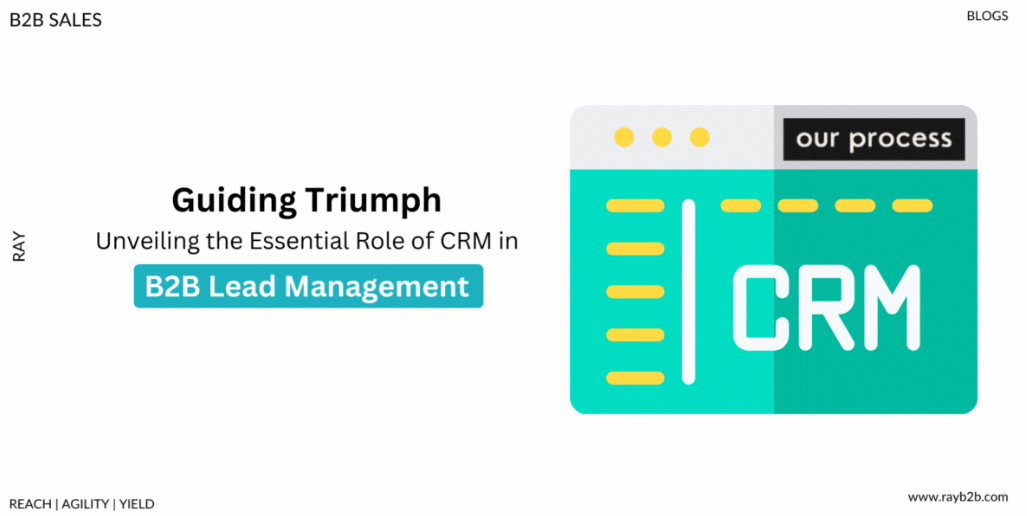
Introduction
Customer Relationship Management (CRM) systems have revolutionized the landscape of B2B lead management. As businesses strive to enhance customer engagement and streamline sales processes, the adoption of sophisticated CRM systems has become imperative. These systems provide a comprehensive solution for managing leads, nurturing prospects, and converting them into loyal customers. In this article, we delve into the essential role of CRM in B2B lead management, exploring its features, benefits, and strategic importance.
The Foundations of CRM in B2B Lead Management
What is CRM?
A Customer Relationship Management (CRM) system is a technology platform designed to manage a company’s interactions with current and potential customers. It uses data analysis to study large amounts of information, aiming to improve business relationships, retain customers, and drive sales growth.
Why CRM is Vital for B2B Lead Management
CRM systems are crucial in B2B lead management for several reasons:
- Centralized Data Storage: CRM consolidates all customer-related information into a single database, enabling easy access and efficient management.
- Enhanced Communication: It facilitates seamless communication within the sales team and with clients, ensuring that all interactions are recorded and accessible.
- Lead Tracking and Management: CRM tools allow businesses to track leads throughout the sales funnel, from initial contact to conversion.
Key Features of CRM Systems in Lead Management
Lead Capture and Nurturing
Effective CRM systems support automated lead capture from various sources, such as web forms, social media, and emails. Once captured, leads are nurtured through targeted marketing campaigns, personalized emails, and timely follow-ups.
Lead Scoring
CRM platforms offer lead scoring functionalities that help prioritize leads based on their engagement level and potential to convert. This ensures that sales teams focus on the most promising leads, optimizing their efforts and resources.
Sales Pipeline Management
A robust CRM system provides a visual representation of the sales pipeline, allowing businesses to monitor the progress of each lead through different stages. This transparency helps in identifying bottlenecks and implementing strategies to expedite the sales process.
Integration with Other Tools
CRMs can integrate with various other business tools such as email marketing software, social media platforms, and analytics tools. This integration enhances the CRM’s functionality and provides a holistic view of customer interactions.
Benefits of Implementing a CRM System
Improved Efficiency
By automating routine tasks such as data entry, follow-up reminders, and email marketing, CRM systems free up valuable time for sales teams to focus on high-value activities. This leads to increased productivity and efficiency.
Enhanced Customer Insights
CRM systems provide deep insights into customer behavior and preferences through data analytics. This information is crucial for tailoring marketing strategies and sales approaches to meet the specific needs of each customer segment.
Better Customer Retention
With features like personalized communication, timely follow-ups, and proactive customer service, CRM systems significantly enhance customer satisfaction and loyalty. This leads to better customer retention rates and long-term business relationships.
Accurate Sales Forecasting
CRM tools offer advanced analytics and reporting capabilities that enable businesses to forecast sales trends accurately. This helps in strategic planning and decision-making, ensuring that resources are allocated effectively to meet future demands.
Strategic Importance of CRM in B2B Lead Management
Streamlining Sales Processes
A well-implemented CRM system streamlines the entire sales process, from lead generation to conversion. It provides a structured approach to managing leads, reducing inefficiencies, and ensuring that no opportunities are missed.
Enhancing Collaboration
CRM systems foster collaboration among sales, marketing, and customer service teams by providing a unified platform for information sharing. This collaboration leads to a more cohesive strategy and a better understanding of customer needs.
Facilitating Data-Driven Decisions
With comprehensive data collection and analysis capabilities, CRM systems empower businesses to make informed, data-driven decisions. This leads to more effective marketing strategies, improved sales tactics, and better overall business performance.
Supporting Scalability
As businesses grow, the need for a scalable solution becomes evident. CRM systems are designed to support growth, allowing businesses to manage an increasing number of leads and customers without compromising on efficiency or service quality.
Conclusion
In the competitive landscape of B2B sales, the role of CRM in lead management cannot be overstated. By providing a centralized platform for managing customer relationships, enhancing communication, and driving sales efficiency, CRM systems are indispensable tools for any business aiming to thrive in the B2B market. Implementing a robust CRM strategy not only boosts lead conversion rates but also fosters long-term customer loyalty and business growth.







